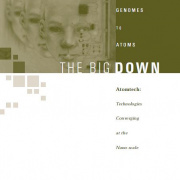The Big Down
Submitted by ETC Group on
The ETC Group (formerly known as RAFI) announces the publication of The Big Down: Atomtech — Technologies Converging at the Nano-scale, the first comprehensive and critical analysis of nanotechnology for civil society and policymakers. The 80-page report seeks to widen civil society’s and policymakers’ focus beyond biotech and genetically engineered crops, and to catalyze widespread public debate on the societal impacts of nanotechnology.
Los Estados Unidos y La Ley de la Semilla
Submitted by ETC Staff on
El primero de noviembre 2002, el embajador de los Estados Unidos ante la Organización de lasNaciones Unidas para la Alimentación y la Agricultura (FAO), anunció lo que parece un arrepentimiento de la política de su gobierno y firmó formalmente el Tratado Internacional sobre Recursos Fitogenéticos. Este no es un cambio de política, solo un cambio de estrategia. Como pasó con el Convenio sobre Diversidad Biológica hace una década, los Estados Unidos "firmarán", pero nunca "ratificarán" la Ley de la Semilla.
The United States and The Law of the Seed
Submitted by ETC Staff on
On November 1st 2002, the new U.S. ambassador to the UN Food and Agricultural Organization (FAO) announced what appeared to be a reversal of his government's policy and formally signed the International Treaty on Plant Genetic Resources. This is not a change of policy - just a change of strategy. As with the Biodiversity Convention a decade ago, the United States will "sign" but never "ratify" the Law of the Seed.
Problemas en el paraiso
Submitted by ETC Staff on
En la reunión anual del CGIAr en Filipinas, el Comité de Organizaciones No Gubernamentales anunció su ruptura de relaciones con el sistema del CGIAR durante todo un año. La razón principal para ello es el fracaso del CGIAR para actuar en consecuencia con el descubrimiento -hace más de 13 meses- de que el maíz transgénico contaminó el centro de diversidad de ese cultivo en México.
Trouble in Paradise
Submitted by ETC Staff on
For the first time in its more than 30-year history, the Consultative Group on International Agricultural Research (CGIAR) – a network of public and private donors that supports sixteen agricultural research centres around the world – held its annual meeting outside the confines of the World Bank in Washington, DC. The CGIAR is the largest public sector agricultural research effort and is mandated to serve the developing world’s poor.

